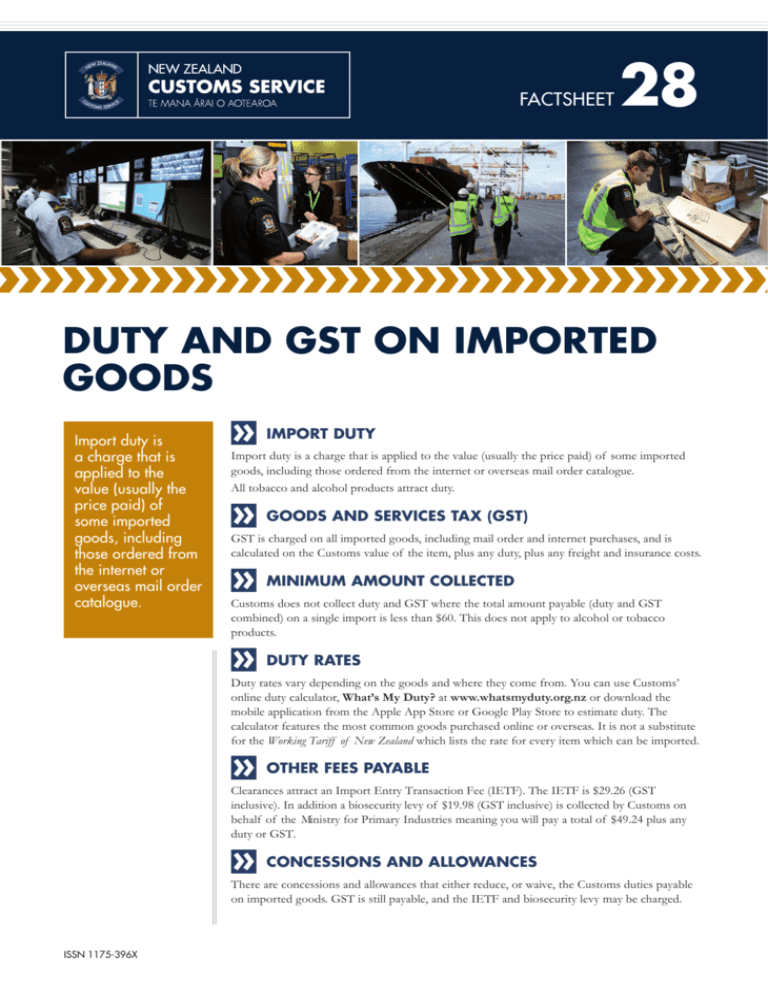Duty and GST on imported goods
advertisement

FACTSHEET 28 DUTY AND GST ON IMPORTED GOODS Import duty is a charge that is applied to the value (usually the price paid) of some imported goods, including those ordered from the internet or overseas mail order catalogue. IMPORT DUTY Import duty is a charge that is applied to the value (usually the price paid) of some imported goods, including those ordered from the internet or overseas mail order catalogue. All tobacco and alcohol products attract duty. GOODS AND SERVICES TAX (GST) GST is charged on all imported goods, including mail order and internet purchases, and is calculated on the Customs value of the item, plus any duty, plus any freight and insurance costs. MINIMUM AMOUNT COLLECTED Customs does not collect duty and GST where the total amount payable (duty and GST combined) on a single import is less than $60. This does not apply to alcohol or tobacco products. DUTY RATES Duty rates vary depending on the goods and where they come from. You can use Customs’ online duty calculator, What’s My Duty? at www.whatsmyduty.org.nz or download the mobile application from the Apple App Store or Google Play Store to estimate duty. The calculator features the most common goods purchased online or overseas. It is not a substitute for the Working Tariff of New Zealand which lists the rate for every item which can be imported. OTHER FEES PAYABLE Clearances attract an Import Entry Transaction Fee (IETF). The IETF is $29.26 (GST inclusive). In addition a biosecurity levy of $19.98 (GST inclusive) is collected by Customs on behalf of the Ministry for Primary Industries meaning you will pay a total of $49.24 plus any duty or GST. CONCESSIONS AND ALLOWANCES There are concessions and allowances that either reduce, or waive, the Customs duties payable on imported goods. GST is still payable, and the IETF and biosecurity levy may be charged. ISSN 1175-396X FACTSHEET 28 Personal effects Clothing and footwear purchased by a New Zealand resident while overseas will be free of duty and GST providing the goods are for personal use and are not a gift, for anyone else, or for sale, or exchange. This applies to both accompanied and unaccompanied personal effects. They don’t have to be worn or used to be duty free but you will need to show they were brought while overseas. This does not apply to goods purchased from New Zealand on the internet or by mail order. Gifts Gifts sent from a person overseas to a person resident in New Zealand with a declared value of NZ$110 or less are eligible for duty free entry provided the gift is unsolicited (not ordered or paid for by the intended recipient) and is of a personal nature. Gifts valued over NZ$110 will attract duty and GST on the value over NZ$110. Gift parcels containing multiple gifts for different people are also eligible for the gift concession if the individual gift can be identified at the border and the identity of each recipient can be established. One gift concession of $110 per individual recipient is allowable but the concession may not be combined by multiple persons on one item. Alcohol products may be allowed the gift concession if the recipient can prove it is a genuine gift, eg, to celebrate a specific occasion and is not being imported to avoid paying of duty and GST. Tobacco products do not qualify for the gift concession. Heirlooms Items bequeathed to people in New Zealand may be imported free of duty and GST. People temporarily overseas at the time the bequest is made can also claim the concession. To be eligible for the heirloom concession, the recipient must be able to prove it is a genuine bequest, and that they are the legal beneficiary of the item(s) from the deceased estate if there is no will. A will or testament detailing the bequest should be produced when the goods are cleared. Copies of, or extracts from documents should be certified as true copies by a Justice of the Peace, public notary, or similar person. If the will does not specify the items concerned, a letter from the solicitors or trustees can also be submitted. Customs also allows heirloom concessions for living bequests. The donor would normally be of advanced age or in a position where the bequest seems proper. Evidence showing the donor is gifting the goods to the recipient should be submitted. Customs acknowledges that each circumstance or case may be different and that supporting documents may not be available. If no supporting documents are available, the beneficiary will need to make a written application describing the circumstances of the bequest and prove that they are not attempting to bypass the standard gift allowance. - ori artefacts and taonga Ma Ma-ori artefacts and taonga acquired overseas are free of duty on repatriation to New Zealand, provided the importation is not being done for commercial gain. 2 Issued August 2015 DUTY AND GST ON IMPORTED GOODS FACTSHEET 28 HOUSEHOLD EFFECTS AND VEHICLES Household items and related effects, motor vehicles, ships, and aircraft can be imported free of duty and GST provided they are imported by a person who has arrived in New Zealand who: » holds New Zealand residence, or a work visa (for a minimum of 12 months), or a three-year visitors visa, at the time of importation; and » has resided outside New Zealand for more than 21 months; and » has owned and personally used the goods prior to importation. Note: The goods must not be for any other person, or for gift, sale, or exchange, or for commercial use. Motor vehicles, ships, and aircraft must have been owned and used for 12 months prior to shipping or the owner’s departure for New Zealand — whichever is the earlier. Size restrictions apply to ships/boats imported by returning New Zealand residents. Duty is payable on unused goods or goods outside of the terms listed above. The full requirements are set out in Part II of the Working Tariff of New Zealand document. HOUSEHOLD EFFECTS AND VEHICLES IMPORTED BEFORE THE OWNER’S ARRIVAL Goods can be cleared ahead of the owner’s arrival. A nominee (friend, relative, employer), appointed by the owner in writing, will need to complete an Unaccompanied Personal Baggage Declaration, NZCS 218, and lodge it with Customs or a customs broker or removal company. Full Customs duties are payable on unused goods or goods outside of the terms of the concessions listed above. IMPORT CONTROLS Animal and plant products There are strict controls on importing animals, and animal and plant products. The Ministry for Primary Industries determines these conditions and importers should contact them for further details: Ministry for Primary Industries, Import Management Office, PO Box 2526, Wellington. Phone 0800 00 83 33 or visit www.mpi.govt.nz Firearms Importing firearms and parts (including airguns) is strictly controlled by the New Zealand Police and a Police permit is required prior to importing. You can contact the Police at: +64 4 474 9499 or at www.police.govt.nz/service/firearms Prohibited imports The following are examples of goods that are prohibited and must not be imported: » objectionable (indecent) articles such as videotapes, films, records, CD-ROMs, and publications » motor vehicles with an incorrect odometer reading or without an odometer » weapons such as flick knives, butterfly knives, swordsticks, knuckle-dusters, and any weapon disguised as another article 3 Issued August 2015 DUTY AND GST ON IMPORTED GOODS FACTSHEET 28 » cannabis and methamphetamine utensils, including bongs, hash and head pipes, and roach clips with a pincer or tweezer action » goods believed to be involved in an attempt, or a conspiracy, to commit a crime involving dishonesty. For a complete list of prohibited goods see fact sheet 5. The following goods are prohibited unless a permit is obtained: » ivory in any form, including jewellery, and carvings » tortoise or sea turtle shell jewellery, and ornaments » meat or food derived from whales, dolphins, rare cranes, and pheasants, or sea turtles » medicines using musk, or rhinoceros or tiger derivatives such as ground horn or bone » carvings or other things made from whalebone or bone from other marine mammals » cat skins » trophies of sea turtles, all big cats, rare reptiles, cranes, pheasants, bears, antelope, and deer » live species, including pet eagles, hawks, owls and parrots, many cacti, orchids, cycads, cyclamens, and carnivorous plants. These goods are covered under the Convention in the Trade of Endangered Species. For more information refer to www.doc.govt.nz/CITES 4 FOR FURTHER INFORMATION WEBSITE: www.customs.govt.nz Contact your nearest office of the New Zealand Customs Service: FACEBOOK: www.facebook.com/NZCustoms Issued August 2015 TWITTER: @NZ_Customs DUTY AND GST ON IMPORTED GOODS TELEPHONE: 0800 4 CUSTOMS (0800 428 786) from within New Zealand 1800 301 861 within Australia +64 9 927 8036 from the rest of the world.








